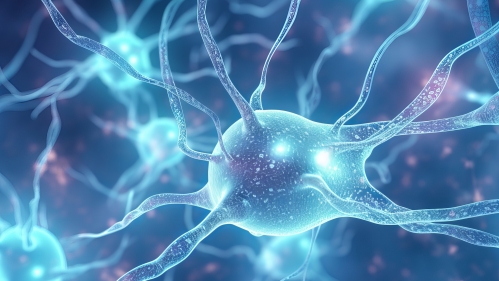
About the Department of Neuroscience and Cell Biology
About
The Department of Neuroscience and Cell Biology is a non-clinical department that has a rich history of excellence in research, education and service. Our faculty contributes to the education of medical, graduate and undergraduate students in the classroom and in the laboratory; carries out research at the forefront of biomedical science while training the next generation of research scientists; and serves the medical school, university, national and international scientific communities.
Message from the Chair

Neuroscience and Cell Biology, a department within Robert Wood Johnson Medical School, pursues strong state of the art research in various biological fields using its extensive research facilities. Faculty research focuses on areas that include regulation of neuronal and glial gene expression as well as cells and pathways impacted during CNS development and disease.
The Department of Neuroscience and Cell Biology also is responsible for teaching aspects of cell biology, histology, gross and developmental anatomy as well as neuroscience for medical students, for hosting and participating in the teaching of courses for graduate students and for hosting a summer undergraduate program in neuroscience. The faculty also teaches neuroscience and gross anatomy to Masters degree students in the School of Graduate Studies.
Extramural research funding has been competitively awarded to departmental faculty members from a range of agencies. Historically, sources of departmental funding have come from the National Institutes of Health, the New Jersey Commission on Science and Technology, the New Jersey Commission on Spinal Cord Research, the New Jersey Commission on Traumatic Brain Injury, National Science Foundation, National Multiple Sclerosis Society, the Governor’s Council for Autism, Ethicon, the National Alliance for Autism Research and private individuals.
Communication and collaboration among the Robert Wood Johnson Medical School and Princeton neuroscience and cell biology communities is fostered through various activities including the graduate student sponsored, “Neuroconnections," The Ira Black Seminar Series and a Departmental Seminar Series. In addition to inviting world-renowned scientists to visit with faculty and students and to give seminars, the Department gives junior faculty and students in our laboratories as well as the surrounding labs the opportunity to present and discuss their research with other colleagues in a public forum.
The Department of Neuroscience and Cell Biology administers the Robert Wood Johnson Medical School Anatomical Association. The Association plays an integral role in education and medical research. It offers a carefully cultured donor system and is obligated to each donor to utilize his or her gift optimally.
Faculty in the department publish extensively in peer-reviewed journals in a wide range of faculty research interests. The faculty serve on editorial boards. They are reviewers for scientific journals and reviewers for private and national funding agencies.
We are very proud of our many accomplishments. Take the opportunity to get to know the Department of Neuroscience and Cell Biology. Peruse the web site and give us a call if you have any questions or if we can assist you in any way.
Cheryl F. Dreyfus, PhD
Distinguished Professor and Chair
Neuroscience Graduate Program
The Graduate Program in Neuroscience includes faculty members from several departments representing neuroscience, cell biology, molecular biology, biochemistry, and psychology, psychiatry, genetics, neurology, and animal sciences. The recently formed Brain Health Institute coordinates Neuroscience activities and seminars throughout the university. Areas of specialization include production and analysis of mutant mouse activity; regulation of neural and glial gene expression; developmental neurobiology; autism; gliogenesis; neurogenesis; spinal cord injury; stem cell biology; synaptic plasticity; mechanisms and regulatory controls of learning and memory.
The program selects students on the basis of their academic records, references, and research experience. A student must have an undergraduate cumulative grade-point average of at least B to be considered for admission. Prerequisite courses normally include biology, general and organic chemistry, calculus, and physics. Financial aid is provided to highly qualified students, and typically includes a stipend to cover living expenses and remission of tuition fees. The classes of direct support include: fellowships, graduate assistantships provided through research grants held by individual professors, NIH training grant, and teaching assistantships associated with individual teaching units of the program.
Life at Rutgers

Envision Yourself Here
Rutgers is located in central New Jersey in the city of New Brunswick and across the Raritan River in Piscataway. Middlesex-Somerset-Hunterdon counties rank fourth in per capita income nationwide. It is a manufacturing center, agricultural center, high-tech corporate center, and small-town America rolled into one.
Full Time Faculty
Explore the list of accomplished faculty comprising the Department of Neuroscience and Cell Biology.
Who We Are
Accordion Content
-
Rocco Carsia, PhD
carsiaro@rwjms.rutgers.eduBarry Grunwerg, DMD
grunwebs@rwjms.rutgers.eduDavid Seiden, PhD
Adjunct Professor
seiden@rwjms.rutgers.edu -
- M. David Egger
- George Krauthamer
- Gordon Macdonald
- Frank Wilson
-
Joan Mordes
Program Assistant
732-235-5390
mordesja@rwjms.rutgers.eduMary Tran
Program Support Specialist
732-235-5391
trant2@rwjms.rutgers.edu
Employment Opportunities
Tenure-Track Faculty Position in Neuroscience and Cell Biology
The three basic science departments at Robert Wood Johnson Medical School seek outstanding candidates for tenure-track Assistant or Associate Professor to fill multiple new faculty positions. We are seeking creative and promising scientists to join the Department of Biochemistry and Molecular Biology, the Department of Neuroscience and Cell Biology, or the Department of Pharmacology.
The medical school is home to a large group of interactive and collegial faculty with federally funded research programs in broad areas of biomedical science. The basic science departments are well integrated into a large, highly collaborative research community across the schools and departments of Rutgers University with multiple centers of excellence. Medical School faculty have access to interdisciplinary, PhD-level graduate training programs and outstanding core facilities including genomics, proteomics, metabolomics, genome editing, confocal microscopy, human neuroimaging, and cryo-EM, among others. Rutgers is also affiliated with the largest university-spinoff biorepository and is home to the Protein Data Bank.
The Department of Neuroscience and Cell Biology is looking for exceptional candidates with expertise and interests in any of a broad range of disciplines. Our research includes the molecular, cellular and circuit bases of neurodevelopment, neurodegeneration, and the roles of neurons and glia in the healthy and diseased brain. Interest exists in both basic and translational research. Approaches include state of the art imaging and electrophysiology, ‘omics, behavioral analyses, and computational modeling.
Qualified candidates must have a PhD, MD, MD/PhD or equivalent graduate degree, postdoctoral experience, a demonstrated record of significant research achievement, the potential to make substantial contributions as an independent investigator, and a commitment to teaching graduate and medical students on topics in the Biomedical Sciences. Junior candidates with independent funding or grants under review are preferred. Mid-level candidates are expected to have a successful history of funding. Salary and academic rank are commensurate with experience; excellent benefits and highly competitive startup packages are offered.
Applicants should submit:
- a letter of interest directed to the Faculty Search Committee;
- a curriculum vitae;
- a one-page summary of important contributions to science;
- a two-page description of future research plans;
- a statement describing their approach to inclusive teaching and integrating diversity in pursuit of academic excellence; and
- full contact information for at least three references.
All offers of employment are contingent upon successful completion of all pre-employment screenings.
Review of applications will begin on November 15, 2023 and continue until the positions are filled. Timely submission of all materials, including confidential letters submitted directly by three referees, is highly recommended for full consideration.
Candidates should apply to their individual department(s) of interest through the ROCS portal:
For questions related to recruitment, please specify the department(s) of interest in the subject line and contact rwjmsbasicscience@rwjms.rutgers.edu.
Life at Rutgers
Rutgers is located at the center of the Northeast corridor, with access to New York City, Philadelphia, and the New Jersey shore within an hour. The region is home to world-class universities, numerous pharmaceutical and biotech research facilities, and corporate headquarters. Piscataway and the surrounding areas in Central New Jersey offer vibrant and diverse cultural activities, excellent public and private schools, and opportunities to live in urban, suburban, or small-town settings within a short distance of campus.
Rutgers is an equal employment opportunity and affirmative action employer. We are deeply committed to increasing diversity and especially encourage applications from persons with disabilities, women, veterans, and minority scholars.
Overview


The Robert Wood Johnson Medical School Anatomical Association Body Program (“Anatomical Association”) is a whole body donor program in which individuals can donate their body for medical science after death. In depth study of the human body is an essential part of medical education that is made possible by generous people who give the ultimate gift of donating their bodies for medical education. Countless individuals enjoy fullness of health in part through their well-educated physicians. These physicians are always mindful of the gift of the human body and acknowledge their indebtedness to their anonymous donors.
Frequently Asked Questions
Accordion Content
-
Passage of the Uniform Anatomical Gift Act in 1968 established guidelines for the bequest of the human body. It reads in part: Any individual of sound mind and 18 years of age or more may give all or any part of his body for any purposes specified, the gift to take effect upon death . . . Any accredited medical or dental school, college, or university [may become a donee of gifts of bodies] for education, research, advancement of medical or dental science or therapy."
-
Two methods are available:
- Pre-Registration: Any New Jersey resident over 18 may be a donor; there is no maximum age. Pre-registration is preferred. To receive information and an application form, call the Anatomical Association office at Robert Wood Johnson Medical School workdays at 1-800-GIFT-211. To apply, follow the instructions attached to the application form. Upon acceptance, you will receive a wallet card which identifies you as a donor. It is helpful to discuss your intentions with your next of kin, and familiarize them with the information in this brochure.
- Bequeathal-After-Death: This form of donation occurs when the family of a deceased but unregistered individual wishes to donate the body to science.
- Pre-Registration: Any New Jersey resident over 18 may be a donor; there is no maximum age. Pre-registration is preferred. To receive information and an application form, call the Anatomical Association office at Robert Wood Johnson Medical School workdays at 1-800-GIFT-211. To apply, follow the instructions attached to the application form. Upon acceptance, you will receive a wallet card which identifies you as a donor. It is helpful to discuss your intentions with your next of kin, and familiarize them with the information in this brochure.
-
The bequest is an arrangement, not a binding legal contract. The arrangement is easily canceled upon written request.
And, what happens when donors relocate outside of New Jersey?When registered donors move from New Jersey, they should notify our office and we will assist them in finding a Program with a medical school in the new location.
When a bequest is made to RWJMSAA, and the donor dies outside of New Jersey, what is the procedure?
It is recommended that the possibility of donating the body to the nearest medical school be explored.
-
Similar to many whole body donor programs, the donor family, or authorized person noted on the signed Bequeathal Form, is responsible for the expense of donor transport. Donors will be transported to the Anatomical Association by the contracted, licensed funeral director, who provides quality service to University donor families. Donor families will be billed directly by the funeral director. The current cost for transporting your loved one is subject to change throughout time. The Anatomical Association assumes the costs for cremation and burial.
-
Acceptance of a bequeathal is not automatic. The decision to accept or reject the donation is always made at the time of death. The person you authorize (chosen earlier by the donor and listed on the bequeathal form) should be aware of your wishes should a rejection occur. Note the criteria in the paragraph below.
-
Reasons for rejection may include:
- Autopsy
- presence or suspected presence of Creutzfeldt-Jakob Disease
- HIV-AIDS
- “C”-Diff
- MRSA
- TB
- Hepatitis
- E-Coli
- Adenovirus
- Coronavirus
- other types of infectious diseases
- extremes of obesity or emaciation
- beginning stages of decomposition
- unhealed surgery
- surgery to chest or abdomen within 6 months prior to passing
- or previous embalming.
The Anatomical Association also reserves the right to decline a donation in the unlikely event that it has exceeded its capacity. When the Anatomical Association must refuse a donation, they notify the donor's authorized person who then handles disposition of the remains.
-
Although unlikely, it is possible that your body would be unacceptable for donation (see previous question), thus you and your authorized person should be aware of possible alternatives. Persons desiring simplicity and economy in funeral arrangements commonly join a memorial society, several of which are in NJ. More information can be obtained from Funeral Consumers Alliance at (800) 765-0107 or (802) 482-3437. Another alternative is to contact your local funeral home and inquire about direct cremation.
-
If death occurs at home and the donor is under hospice care, once hospice has pronounced the deceased, the family should immediately notify the Anatomical Association at (1-800-GIFT-211) - DO NOT call a local funeral home, as this may result in the donation being declined.
If death occurs at home and this is not a hospice case, call your local police who will assist you in arranging the pronouncement and then notify the Anatomical Association at 1-800-GIFT-211. If death occurs in a hospital or nursing home, personnel should immediately notify the Anatomical Association and families should verify that the call was made. Once notified, the Anatomical Association will arrange transportation, if body is acceptable. -
Our primary responsibility is to meet the educational and research needs of Rutgers University. Occasionally the Anatomical Association receives requests for bodies for medical education and/or research taking place at other facilities, and may fill those needs according to rigid criteria. Therefore, at its discretion, the Anatomical Association may temporarily transfer a body to an approved teaching institution or research facility within New Jersey or the surrounding area.
-
No. Conveyance of the body must occur immediately. At their convenience, families may wish to plan a memorial service, or other appropriate remembrance as a means to closure.
-
The donor's physician must sign the death certificate, then the Anatomical Association will file the death certificate. The day a certificate is filed, ONE CERTIFIED COPY will be mailed to the authorized person (chosen earlier by the donor and listed on the Bequeathal Form). The Anatomical Association will also provide information where the family may obtain additional certified copies of the death certificate.
Trust

Generous residents of New Jersey honor us each year by registering as donors. Currently, over 14,000 people have registered with the Robert Wood Johnson Medical School Anatomical Association and placed their trust in us to honor and carry out their final wishes. Our pledge to these remarkable individuals and their families is that we will ensure the appropriate use of their remains toward the advancement of medical education.
The Ultimate Gift

In depth study of the human body is a very important part of medical education that is possible because conscientious people donate their bodies for medical education. Countless individuals enjoy fullness of health in part through their well educated physicians. These physicians are always mindful of the gift of the human body and acknowledge their indebtedness to their anonymous donors.
Integrity and Respect for the Remains
The Anatomical Association (formerly Rutgers Pathological and Anatomical Association) has been in existence for over 40 years. In complete compliance with state and federal regulations. The Anatomical Association does not and will never engage in profiteering from the use of human remains. All donated remains are handled and treated in accordance with the highest ethical standards. The donor’s survivors may derive comfort in the knowledge that all people involved in medical education hold the life process in reverence and respect the remains in our care and protection at all times. We responsibly carry out the final wishes of the donor and of the family.
Contact Us
- Grace Pinhal-Enfield, PhD, Director
- Rebeca Santiago, Program Support Specialist
- Cheryl L. Schroeder, Practitioner of Mortuary Science (N.J. Lic. No. 3526)
- Nikola Zaturoski, Practitioner of Mortuary Science (N.J. Lic. No. 5051)
- Diandra Dwyer, Research Assistant
- Alysa Santana, Office Assistant
Our Location
Rutgers, The State University of New Jersey
Robert Wood Johnson Medical School
Anatomical Association
675 Hoes Lane West, Room R327
Piscataway, NJ 08854-5635
Phone: 1-800-443-8211
Fax: (732) 235-3249
e-mail: santanre@rwjms.rutgers.edu
If you would like additional information about the Robert Wood Johnson Medical School Anatomical Association Whole Body Donor Program, you may call 1-800 443-8211 or email your name and address to santanre@rwjms.rutgers.edu.
Make A Monetary Donation
We gratefully accept monetary gifts in memory/in honor of a loved one.
Staff Listing
The Basic Science Departments Administration supports the non-clinical departments at the medical school: The Department of Biochemistry and Molecular Biology; The Department of Neuroscience and Cell Biology; The Department of Pharmacology.
Responsibilities include general administration and operations; finance and budget; human resources and international student and scholar services; pre and post award grants and contracts administration; procurement and acquisitions.
Jonathan Weininger, CRA
Business Administrator
Research Tower R136
732-235-5068
weininja@rwjms.rutgers.edu
Caryn Carroll
Principal Management Assistant
Research Tower R136
732-235-4580
carrolcc@rwjms.rutgers.edu
Letice Smith
Administrative Analyst
Research Tower R125
732-235-4551
smithla@rwjms.rutgers.edu
Mayra Paz
Program Assistant
Research Tower
mp1753@rutgers.edu
Jamie Carr
Senior Grants Administrator
Research Tower R133
732-235-2107
carrj1@rwjms.rutgers.edu
Deshanda Porter
Senior Grants Administrator
Research Tower R134
732-235-4603
dp987@rwjms.rutgers.edu
Toni Napier
Senior Grants Administrator
Research Tower R134A
732-235-5249
toniann@rwjms.rutgers.edu
Bella Mercado
Principal Lab Assistant
732-235-5659
mercadbg@rwjms.rutgers.edu
Central NJ Regional Brain Bee Competition
Our Regional Brain Bee is part of an annual international competition for High School Students testing their knowledge in the field of Neuroscience, sponsored in part by the Society for Neuroscience based in Washington DC, the largest professional Neuroscience society in the world.
NeuroSURP Alumni Virtual Reunion / Open House!
We are hosting a virtual Open House for participants to meet the Rutgers NeuroSURP program directors as well as alumni of the program to learn about our amazing program! In addition to prospective students, we invite alumni to register to reconnect with their friends and network with alum from other years!
Open House details:
Thursday, January 8, 2026 from 5:30 - 6:30pm Eastern Time
Click here to register!
Overview
Summer Undergraduate Research Program in Neuroscience (NeuroSURP)
The primary purpose of our program, established in 1996, is to provide 12 students with a closely-mentored, hands-on graduate level basic research experience in an active neuroscience laboratory on the Piscatway or New Brunswick campus of Rutgers University.
A second important goal, and one that distinguishes us from most other SURPs, is to provide students with career development and educational activities. These occur throughout the program, and are intended to increase knowledge and interest in pursuing careers in research.
Our program is primarily funded by an R25 Award from the National Institutes of Health (NIH)/NINDS. We will be proudly entering our 15th year of support from the NIH in 2026.
Information for 2026:
- Application link will open on January 2nd, 2026 and close on February 16th, 2026.
- The 2026 session will take place between May 26th, 2026 and July 31st, 2026.
- Students are expected to be in the laboratory during regular weekday working hours and in addition attend weekly group lunch meetings. Click here to see sample schedule from 2025.
- 12 students will be admitted to the program from the current applicant pool.
- All SURP students attending the session will receive a $4000 stipend.
Admission and Applicant Information
Admission:
- All are welcome to apply and those who have not had access to research opportunities are especially encouraged to apply.
- Prior research experience is not required.
Applicants:
-
Must be United States citizens or permanent residents.
-
Must have completed at least one year of college prior to the start of the program. Applicants who will have received their undergraduate degree prior to the start of the program are NOT eligible.
-
Should be in good academic standing and have had some coursework in biology.
-
Should clearly articulate an interest in neuroscience and in pursuing a career in neuroscience related research.
-
Will NOT be considered if they are already admitted to graduate or professional programs (e.g., BA/MD).
-
Must be prepared to start the program on May 26, 2026 (limited accommodations can be made if this is not possible).
Accordion Content
-
The following items are required:
1. Curriculum Vitae/Resume.
2. Personal statement addressing the following questions specified in the application:
- Why would you like to participate in our NeuroSURP?
- If you have had prior research experience, briefly describe the objectives of the project and your contribution. If you have not had prior research experience, briefly describe what you would like to learn this summer (note that prior research is NOT a requirement).
- What are your current near-term (next 3-4 years) goals for your education and career?
- Please tell us something unique about yourself that may set you apart from the other applicants.
3. Unofficial electronic copy of college transcript (note that official copy will be required if you are accepted to the program).
4. Two letters of recommendation submitted via the online application system (letters can be requested anytime from within the online appication system before submitting your final application).
- All components of the application must be received prior to the deadline in order to be considered.
- There is no interview process.
- APPLICATION LINK will open on January 2nd, 2026 and will close on February 16th, 2026.
- Applicants will be notified of their status no later than April 15, 2026.
- Why would you like to participate in our NeuroSURP?
- If you have had prior research experience, briefly describe the objectives of the project and your contribution. If you have not had prior research experience, briefly describe what you would like to learn this summer (note that prior research is NOT a requirement).
- What are your current near-term (next 3-4 years) goals for your education and career?
- Please tell us something unique about yourself that may set you apart from the other applicants.
Program Components
Accordion Content
-
Students in our program spend the majority of their time (regular weekday working hours) carrying out a research project under the supervision of program faculty mentors, similar to a research rotation for first-year PhD graduate students. This process involves formulating and articulating a hypothesis, learning laboratory skills, solving problems, collecting and documenting data, attending lab meetings and journal clubs, and presenting their work at the end of the summer.
Lab Matching
Admitted students will receive a description of the research projects available in each mentors laboratory prior to the start of the program, and will rank their preferences accordingly. These descriptions will include all the information necessary to make an informed choice, including details of the experiments to be performed, the model system/s used, the laboratory personnel who will directly supervise the students, and other information about the research focus in each lab.
As an example of the scope of research performed, the following faculty mentors participated in the 2025 session (please note that the list of mentor labs changes somewhat from year to year):
Principal Investigators (PIs)
-
During the course of the program, students will have many opportunities to learn about the multitude of career paths available to individuals with an advanced degree in science (i.e., PhD, MD/PhD).
Career development activities primarily take place during weekly group lunch meetings attended by SURP students and the program Co-PIs. During these meetings, students will have an opportunity to meet and interact with invited guest speakers, including representatives of Rutgers graduate and medical schools who discuss the admission process, students, post-docs, early and established career research scientists in academia, as well as select representatives from diverse career paths including the biopharmaceutical industry. The format of the weekly group lunch meetings will be similar prior to pandemic restrictions. Click here to see sample schedule from 2025.
Lunch meetings will include:
- Three ~1 hour lectures focusing on Disorders of the Nervous System, covering the topics of Neural Development, Synaptic Transmission, Sensory and Motor Systems, and Brain and Behavior.
- Guidance on reading and understanding primary scientific literature.
- Guidance in public speaking. Our program culminates in a public research symposium where students will present their findings in a 15 minute talk attended by members of the research community, sponsors of the program, and other guests.
- Guidance in writing up their research report that will be submitted at the end of the program.
- Training in the responsible conduct of research.
- Training in lab safety.
- In addition, students will have additional opportunities that include:
- The opportunity to design a class-specific T-shirt to commemorate your time in the program.
Stipend, Housing and Transportation
All students in the program receive a $4000 stipend and free housing in a secure building on the College Avenue Campus of Rutgers University.
Campus-wide shuttle bus access is available throughout the summer for transport between student housing and research labs.
Student housing is located in a lively area of New Brunswick within walking distance to numerous restaurants, shops, and public transportation (NJ Transit) to New York City (~40 minutes) and Philadelphia (~1 hour).
All students are strongly encouraged to live in the dorm with their SURP peers during the program. The personal bonds that form under these conditions will last a lifetime.
The program will cover travel expenses related to transportation to and from the students' permanent residence at the beginning and end of the program.
Admitted applicants will receive detailed information on these and other important program related topics in late April and May prior to the start of the program.
Support
We gratefully acknowledge ongoing program support from the following sources:
-
NINDS "Summer Undergraduate Research Program in Neuroscience" (Award #R25NS105143)
-
The Department of Neuroscience and Cell Biology at Robert Wood Johnson Medical School
-
School of Graduate Studies
Contact
Please direct inquiries about the program to Ms. Joan Mordes or to the co-directors: Dr. Janet Alder, Dr. Huaye Zhang, or Dr. Aaron Milstein.
Program Administrator full contact information:
Ms. Joan Mordes
SURP Program Administrative Coordinator
Department of Neuroscience and Cell Biology
Robert Wood Johnson Medical School
683 Hoes Lane West, Research Building 363
Piscataway, NJ 08854
Phone: 732-235-5390
